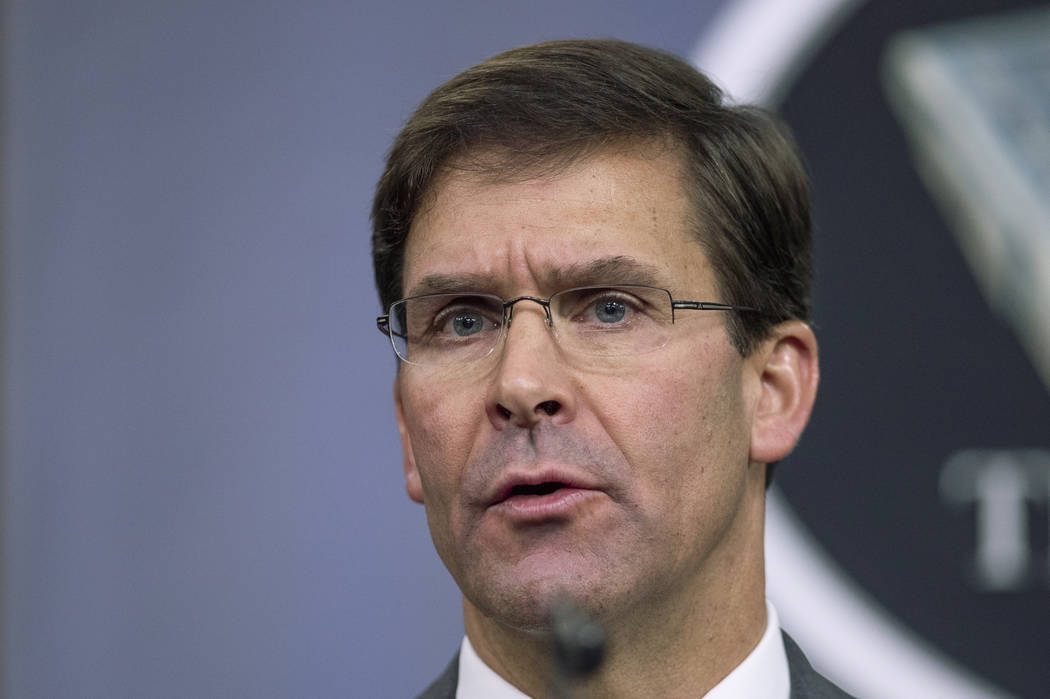US defense chief criticizes ‘impulsive’ Turk decision to invade Syria

WASHINGTON— An “impulsive” decision by Turkey to invade northern Syria will further destabilize a region already caught up in civil war, but a pullback of U.S. troops from the border does not mean America has abandoned its Syrian Kurdish partners, Defense Secretary Mark Esper said Friday.
Washington is “greatly disappointed” by the Turkish incursion, Esper told a Pentagon news conference. He said it has badly damaged already frayed relations with Turkey, a NATO ally ousted from a Pentagon fighter jet program in July for refusing to drop its purchase of a Russian air defense system that is incompatible with NATO.
Many have called President Donald Trump’s decision Sunday to pull a small number of U.S. troops away from the Turkish border a grave mistake. Even some of his staunchest Republican supporters have sharply criticized the decision and urged him to reconsider. Some regard it as a betrayal of the U.S.-armed Kurdish fighters who have, at great cost, partnered with U.S. forces against the Islamic State group since 2015.
Esper insisted the Kurds remain a viable partner.
Not abandoning Kurds
“To be clear, we are not abandoning our Kurdish partner forces, and U.S. troops remain with them in other parts of Syria. The impulsive action of President (Recep Tayyip) Erdogan to invade northern Syria has put the United States in a tough situation,” Esper said.
The Turkish invasion also has raised the prospect of losing control of thousands of captured Islamic State fighters.
Esper called on the Turks to halt their operation, but he told reporters that he has no indication they are willing to do so. He lamented “the dramatic harm” done to the two nations’ relationship.
IS prisoners still guarded
Speaking alongside Esper, Gen. Mark Milley said the U.S.-backed Syrian Kurdish military known as the Syrian Democratic Forces, is still guarding camps holding IS prisoners.
Milley, the chairman of the Joint Chiefs of Staff, said the Turkish military operations across the border into Syria are still “relatively limited.”
He said the operations have been carried out near two Syrian villages by about 1,000 members of the Turkish-backed Free Syrian Army and hundreds of Turkish commando forces. The distance they have penetrated into Syria ranges from a kilometer or two (about 1 mile) in one area to about 10 kilometers (6.2 miles) in another.
Milley emphasized that U.S. forces are still working with Kurdish forces. He said U.S. policy is to continue with a counter-ISIS campaign except in one area of the incursion.
He said the Turks “know exactly where American forces are” throughout Syria and in the invasion zone. They have been told that U.S. troops will defend themselves if needed, he said.
Tamp things down
Milley said leaders of the Kurdish force have told some of their fighters to move north to defend what they consider to be their territory. But he said the U.S. is “encouraging them to not overreact at this point and to try to tamp things down in order to allow some sort of diplomatic resolution.”
Esper’s remarks were the Pentagon’s most explicit criticism of the Turkish operation, which began Wednesday as a campaign against the Syrian Kurd-led militia that has partnered with U.S. forces over the past five years to fight the Islamic State.
President Donald Trump has called the invasion a “bad idea” and held out the possibility of the U.S. mediating a settlement.
A senior Turkish official in Washington suggested that the U.S. mediation offer would not be welcomed in Ankara due to Turkey’s opposition to negotiating with terrorists. The official, who was not authorized to discuss the matter publicly and spoke on condition of anonymity, said previous efforts to broker deals with the Kurds had failed because negotiating “will not change their basic motivation and will not change their tactics.”
Turkey will stop after border area cleared
The official reiterated that Turkey would halt the operation and withdraw its forces only after the border area is cleared of “terrorists” but would not stay in Syria “one more day than is necessary.”
The Pentagon had said before the operation began that the U.S. military would not support it, but it had not openly criticized the invasion. The U.S. pulled about 30 special operations troops out of observation posts along the invasion route on the Syrian border.
Turkey views elements of the U.S.-backed Syrian militia as terrorists and a border threat.
The U.S. has about 1,000 troops in Syria.
International aid agencies have warned of a humanitarian crisis, with nearly a half-million people at risk near the border.
In a written statement, the chief Pentagon spokesman, Jonathan Hoffman, said that in a phone call Thursday with his Turkish counterpart, Esper “made it clear” that the U.S. opposes the incursion.
Hoffman said Esper told Defense Minister Hulusi Akar that his government’s military actions “place at risk” the progress made to defeat the extremists, and Esper urged Turkey to stop its incursion.
Milley spoke by phone Wednesday with his Turkish counterpart to discuss the security situation in Syria. Details were not released.
The Turkish incursion has complicated U.S. military efforts in the region, even as Washington seeks to deter Iran from further attacks on Saudi Arabia following a drone and cruise missile assault in September that damaged key Saudi oil facilities. In response, the U.S. said it as deploying additional air defenses to Saudi Arabia.